Travel Sketchbooks
Throughout her life, Saar has made drawings and collages in response to the places she visits. Unlike the other sketchbooks on display, these works were created without a specific assemblage, collage, or sculptural tableau in mind. Instead, they resemble private souvenirs, combining material and visual traces of her travels with elements
of her established artistic vocabulary. For example, Saar’s 1975 Mexico sketchbook includes images of eyes, hearts, hands, and celestial bodies—leitmotifs that appear throughout her work. Among the mementos pasted into her 1994 sketchbook from Brazil is an image of a lion; as a Leo, Saar frequently includes lions in her art.
All travel sketchbooks are from the collection of Betye Saar, courtesy of the artist and Roberts Projects, Los Angeles
Rachel Federman: As you look at Betty Saar's travel sketchbooks, listen to her reciting her 1993 poem, My Secret Heart.
Betye Saar: My secret heart is seduced by twilight. It remembers the colors of dreams. It longs for solitude and the exotic. My secret heart is a wanderer. It sails the sea of imagination. It soars beyond the clouds, seeking the mysterious. It moves through time, dream time, and space, mind space. My secret heart seeks the dusty, musty, forgotten corners. It constantly haunts hunts, collects, gathers objects, images, feelings. It mixes, matches, embellishes, simplifies, camouflages, fabricates to empower the ordinary to invent artifacts. My secret heart, bridges, memory and vision. It pays homage to lost rituals of unknown civilizations. It expands horizons only to condense them into a frame, a box, a room. My secret heart is ageless. It beats within the rainbow babe in the woods, and it dwells in the house of whispers.
Audio: www.netropolitan.org ©2002
Page from U.S.A. sketchbook, Santa Fe, Museum of International Folk Art, 1988–91

Betye Saar
Page from U.S.A. sketchbook, Santa Fe, Museum of International Folk Art, 1988–91
Watercolor and ballpoint pen on paper
Courtesy of the artist and Roberts Projects, Los Angeles, California. © Betye Saar.
photo © Museum Associates/LACMA
Page from California sketchbook
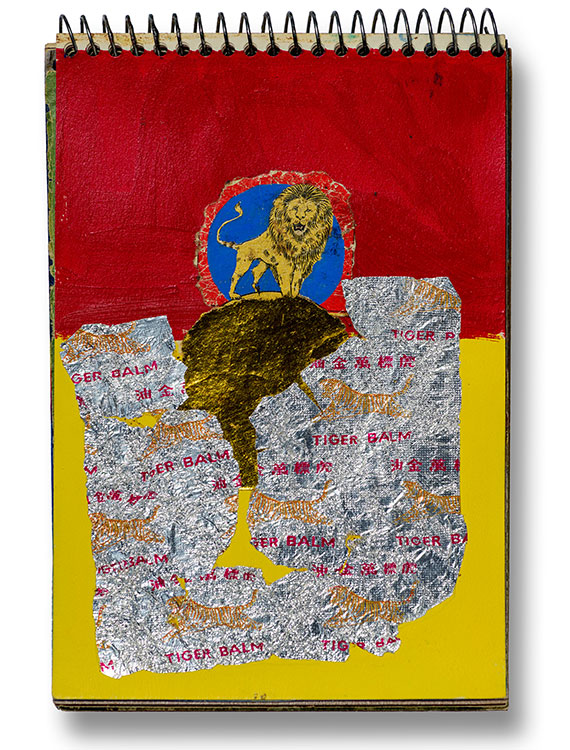
Betye Saar
Page from California sketchbook, 1975
Acrylic and collage on paper
Courtesy of the artist and Roberts Projects, Los Angeles, California. © Betye Saar.
photo © Museum Associates/LACMA
Page from Brazil/Los Angeles sketchbook

Betye Saar
Page from Brazil/Los Angeles sketchbook, 1983/88
Collage and gouache on paper
Courtesy of the artist and Roberts Projects, Los Angeles, California. © Betye Saar.
photo © Museum Associates/LACMA
Page from Oaxaca sketchbook

Betye Saar
Page from Oaxaca sketchbook, April 1985
Acrylic, gouache, and collage on paper
Courtesy of the artist and Roberts Projects, Los Angeles, California. © Betye Saar.
photo © Museum Associates/LACMA
Spread from Mexico sketchbook
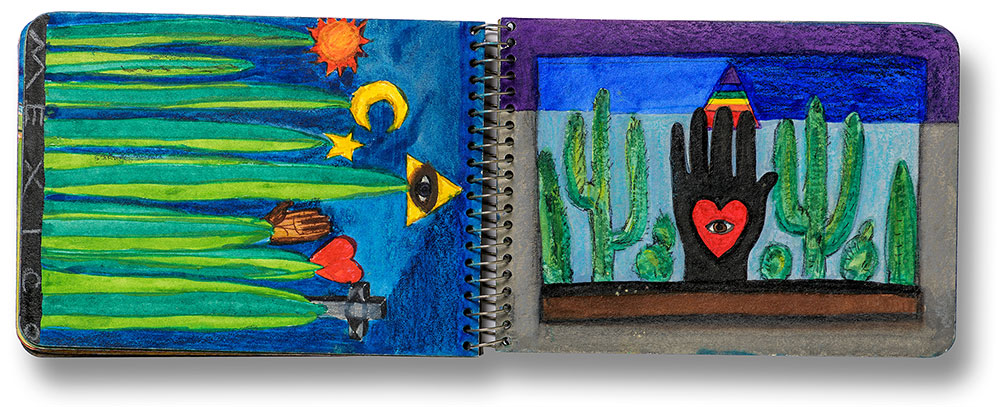
Betye Saar
Spread from Mexico sketchbook, June 1975
Gouache, watercolor, and pencil on paper
Courtesy of the artist and Roberts Projects, Los Angeles, California. © Betye Saar.
photo © Museum Associates/LACMA
Spread from Taiwan sketchbook

Betye Saar
Spread from Taiwan sketchbook, 1988
Watercolor and collage on paper
Courtesy of the artist and Roberts Projects, Los Angeles, California. © Betye Saar.
photo © Museum Associates/LACMA
Spread from Haiti sketchbook

Betye Saar
Spread from Haiti sketchbook, 26 July 1978
Watercolor, marker, and colored pencil on paper
Courtesy of the artist and Roberts Projects, Los Angeles, California. © Betye Saar.
photo © Museum Associates/LACMA
Page from Haiti sketchbook
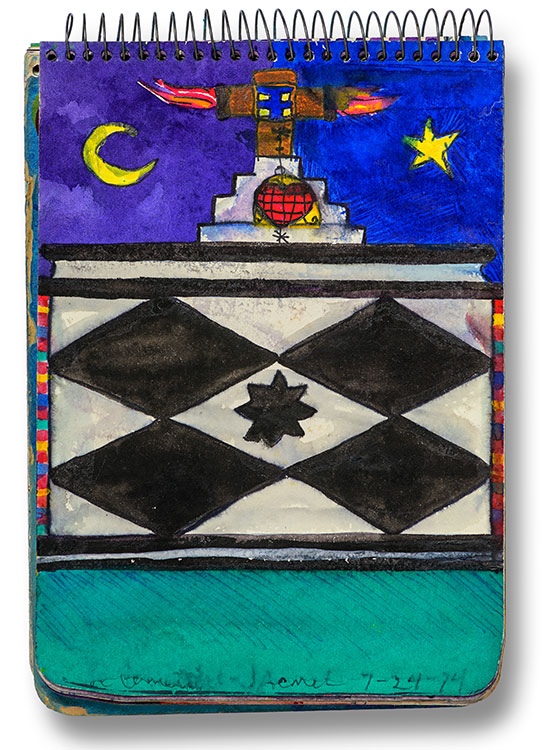
This sketchbook page incorporates black-and-white lozenge motifs from a grave monument Saar saw in a cemetery in Jacmel, Haiti. They are combined with imagery seen throughout her work: celestial bodies, a heart, and a burning cross.
Betye Saar
Page from Haiti sketchbook, 24 July 1974
Watercolor, ballpoint pen, and ink on paper
Courtesy of the artist and Roberts Projects, Los Angeles, California. © Betye Saar.
photo © Museum Associates/LACMA
Page from Aix-en-Provence, France/Los Angeles sketchbook
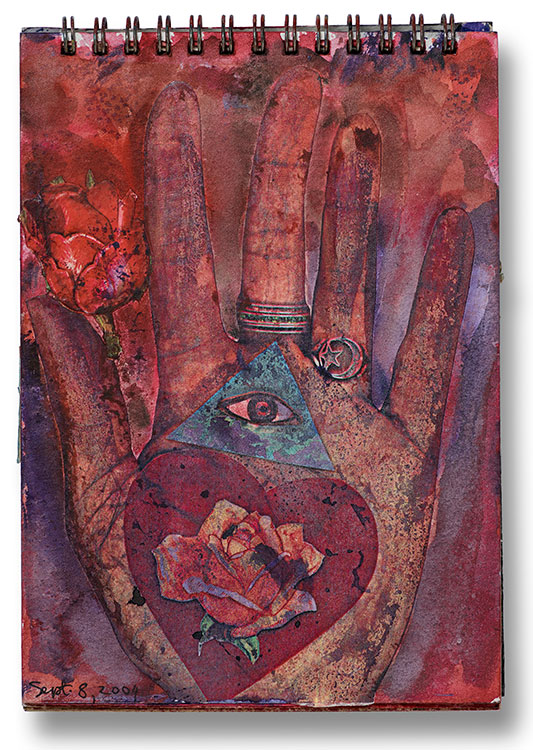
This sketchbook page refers to the hamsa, an amulet in the form of the palm of a hand that is popular throughout the Middle East and North Africa. Often containing the image of an eye, the hamsa is considered a
defense against the evil eye. The palm of the hand—here a silhouette of the artist’s own—symbolizes fortune for Saar.
Betye Saar
Page from Aix-en-Provence, France/Los Angeles sketchbook, 8 September 2004
Collage and watercolor on paper
Courtesy of the artist and Roberts Projects, Los Angeles, California. © Betye Saar.
photo © Museum Associates/LACMA
Page from Brazil sketchbook
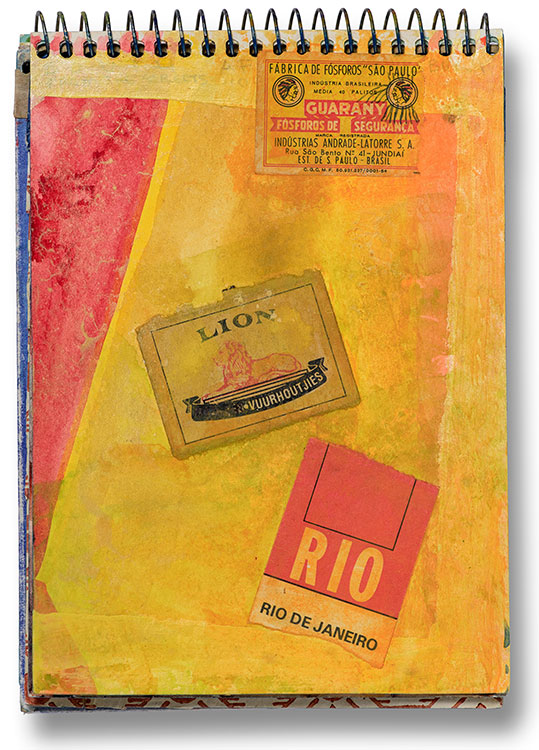
In the fall of 1994, Saar traveled to Brazil for the twenty-second International Biennial in São Paulo. Her work was featured
in an exhibition alongside that of John Outterbridge (b. 1933), a fellow assemblage artist from California. The following year, Saar visited South Africa when the exhibition traveled to Johannesburg.
Betye Saar
Page from Brazil sketchbook, 1994
Watercolor and collage on paper
Courtesy of the artist and Roberts Projects, Los Angeles, California. © Betye Saar.
photo © Museum Associates/LACMA
